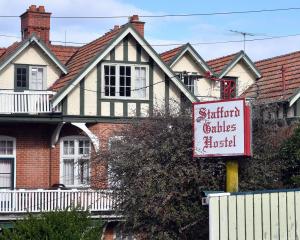The social failure is propped up by a state system: homeless people’s rent is being paid directly from their benefits to private boarding house landlords, some providing grim rooms in diabolical buildings for about $1000 a month.
It isn’t just about the state of buildings. The investigation found homeless people crammed together facing daily risks, not getting the social or medical help they need to claw their way up from rock bottom.
Dunedin deputy mayor Sophie Barker branded the ODT’s revelations "horrifying and disgusting" and pledged to request a council report on boarding houses and homelessness.
Two boarding houses the ODT visited showed evidence of higher standards and some help at hand. However, others revealed a deadly cocktail of dilapidated living conditions, neglect of people’s needs and risks from violence, drugs and other anti-social behaviours.
Homeless people, frequently filthy and in old clothes, were living in stinking, chaotic rooms. Bare, stained mattresses were a common sight.
We spoke to tenants of all ages, including young people with uncertain futures and older people suffering chronic diseases such as emphysema.
In one boarding house, tenants talked of a resident’s body discovered days after death "dissolved into the mattress". In two others, ageing residents only had access to a toilet by going outside.

Most occupants were male. Women we spoke to reported escaping domestic violence, prior to homelessness.
The Ministry of Social Development (MSD) does not vet landlords.
The MSD told the ODT: "People make their own decisions about whether accommodation is suitable."
When asked for a comment, Deputy Prime Minister Carmel Sepuloni could not respond by deadline.
Cr Barker said: "No-one should be living like that. We pride ourselves on being a city that cares. This has been a hidden problem and there must be change to create conditions in which our whole community flourishes — this is much bigger than building houses."
Dunedin City Council housing policy adviser Gill Brown said the council was working within its housing plan to "address homelessness".
Council officials would update councillors next month about a "city-wide approach that will encompass boarding houses".
Responding to the ODT’s investigation, Salvation Army policy lead Paul Barber called for homeless people to be given a chance to escape "tragic and harrowing experiences". He called for "wrap-around support" and boarding house regulation.

Dunedin Night Shelter manager David McKenzie branded the current system a "wicked problem", despite "good intentions" by government, charities and individuals, which contributed to more mental health problems, addictions and criminal behaviour.
Homeless people had a "no-win" choice to hit the streets or enter "often very poor accommodation that collects people with vulnerabilities".
Kim Brash, property manager of boarding house provider Purple Properties — which runs one of two higher-end boarding houses the ODT visited — said: "Profit should never supersede looking after people’s welfare."
Responding to whether there should be more support for homeless people, other Dunedin boarding house owners agreed.
Ted Ottrey said: "The majority of people we house don’t fit into ‘normal society’ and don’t get help they need to have a healthy lifestyle. It would be fantastic to see more hands-on support for these people instead of an ‘it’s not my problem’ mentality."
Campbell Hancock, another owner, added: "There should be more taxation of the rich to help people at the bottom."
Investigation continues tomorrow:











